Arrangementer - Side 7
In this online seminar, we will discuss Jaganath Sankaran and Steve Fetter's paper "Defending the United States: Revisiting National Missile Defense against North Korea"
Business and Climate Policy Development: When Does Opposition Become Support?
Title of the presentation: "License to Educate: The Role of National Networks in Colonial Empires"
What role are cyber operations playing in the Ukrainian war? In this presentation, Dr Philipp Lutscher will elaborate on how Ukraine became a testbed for Russian cyber actions since 2014, talk about different activities, such as Denial-of-Service attacks and their motivation, and show that such cyber operations played a rather marginal role in the conflict thus far. Finally, Philipp will talk about Russia's strategy of information control, more precisely, the use of bots, disinformation campaigns, and censorship.
Title of the presentation: "Colonial Education, Political Elites, and Regional Political Inequality in Africa"
How Public Service Users React to Bureaucratic Scandals: Evidence from a Real-World Embezzlement Case
I dette seminaret snakker vi om karrierermuligheter innen data-vitenskap.
Written Directives and Chinese Ministerial Tenure: A New Measurement for Political Performance?
Is the state we want, the state we can have? Policy ambition and implementation capacities in the long run
Title of the presentation: "Privileging one's own? Voting patterns and politicized spending in India"
Silje S. L. Hermansen presents joint work with Urska Sadl entitled Judicious judging: The effect of political debate on judicial decision making
Delta via zoom
The changing politics of vaccines – the main principles and the challenges of allocation in practice
In this online seminar, we will discuss Even Hellan Larsen's paper "Deliberate nuclear first use in an era of asymmetry: a game theoretical approach"
Title of the presentation "Great Power Competition and the Domestic Politics of 'Swing' States: Southern Asia since 1945"
Title of the presentation "The Politics of COVID-19 Containment: The Curious Case of Tanzania"
In this online seminar, we will discuss Erik Lin-Greenbergs paper "Cheap Tweets: Crisis Signaling in the Age of Twitter".
Life at the top - Understanding top bureaucrats’ roles as the link between politics and administration
Title of the presentation "Vox Populi. Public Support for the Popular Initiative"
In this online seminar, we will discuss Caitlin Talmadge's draft paper with Vipin Narang and Lisa Michelini, “When Actions Speak Louder than Words: Adversary Perceptions of Nuclear No First Use Pledges.”
Policy Integration, Institutional Change and the Governance of Complex Problems
Title of the presentation "International Sports Events, Media Attention, and Repression: Evidence from the 1978 FIFA World Cup"
Abstract
How do international sports events shape repression in authoritarian host countries? International tournaments promise unique gains in political prestige through global media attention. However, autocrats must fear that foreign journalists will unmask their wrongdoings. We argue that autocracies solve this dilemma by strategically adjusting repression according to the spatial-temporal presence of international media. Using original, highly disaggregated data on the 1978 World Cup, we demonstrate that the Argentine host government largely refrained from repression during the tournament, but preemptively cleansed the streets beforehand. These adjustments specifically occurred around hotels reserved for foreign journalists. Additional tests demonstrate that: 1) before the tournament, repression turned increasingly covert, 2) during the tournament, targeting patterns mirrored the working shifts of foreign journalists, 3) after the tournament, regime violence again spiked in locations where international media had been present. Together, the paper highlights the human costs of mega-events, contradicting the common whitewashing rhetoric of functionaries
Student Financing for Social Equity in Norway, 1947–2020
Title of the presentation "Ethnic Inequality and Regime Change: Investigating an Asymmetric Relationship"
Abstract


